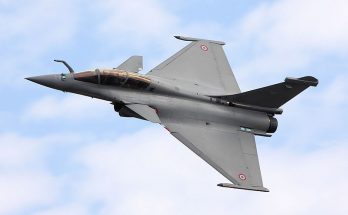A $500 million deal involving the sale of second-hand Israel F-16s to Croatia appears to have reached a dead end due to U.S. objections. The sale of 12 ex-Israeli Air Force F-16D ‘Barak’ fighters upgraded with sophisticated Israeli electronic warfare suites and radar systems was blocked by the U.S. State Department, thus reverting back to square one what would have been the most expensive acquisition made by Croatia since its independence from the former Yugoslavia.
As the proposed sale involved American-made technology being purchased by, and transferred to, a third party approval by Washington remained a requisite for finalizing the deal.
U.S. officials insisted Israel strip out the upgraded systems installed in the aircraft post-delivery before selling the planes to Croatia, arguing that otherwise Israel would be unfairly profiting from the sale. Israeli officials were unable to convince the U.S. to change its stance – a rare block of a transfer to a NATO partner.
Croatia officials, however, noted that it was due to the Israeli-installed systems and the upgraded state of the fighters that resulted in the Israeli bid being down-selected in the Croatian fighter acquisition contest. The Israeli offer beat out bids from the U.S. and Greece, which both offered up their own secondhand F-16s. Sweden, meanwhile, pitched its JAS-39C Gripen as an alternative.
Israel confirms F-16 sale to Croatia nixed over Washington’s objections https://t.co/neVRHnpDXR
— The Times of Israel (@TimesofIsrael) January 10, 2019
Croatia’s long-awaited quest to replace the MiG-21bis jet fighters acquired from Ukraine in the early 1990s began with requests for information (RFIs) sent out to potential suppliers in 2015. Then, on July 20, 2017, formal tender was launched when Request for Proposals (RFP) were issued to five countries regarding a potential government-to-government acquisition of 12 multirole combat aircraft.
Croatia’s Defense Council – a hierarchy of government officials including the country’s President and Prime Minister – reached a consensus on March 27, 2018, opting for the Israeli bid. The acquisition would have involved the 12 fighters, plus two flight simulators, training of pilots and maintenance staff, plus weaponry for the aircraft.
The Croatian Defense Ministry presented Israel with a January 11 deadline for providing when it would be capable of beginning deliveries of the F-16s. Originally it was expected that deliveries of the first jets to the Croatian Air Force would begin by 2020. Once the full fleet had entered service Croatia planned on operating the F-16s for a period of up to 25 years.
Israeli director-general of the Defense Ministry, Udi Adam, ultimately flew to Zagreb on January 9 to try and salvage the deal with Croatian Defense Minister Damir Krsticevic.
But now it appears the proposed sale will be cancelled. For his part Krsticevic has come under pressure for the failure to see the deal completed. Just a week ago he had mentioned “pre-guarantees” provided by Israel during the bidding process that the U.S. would grant its transfer approval.
Adding to Croatia’s dilemma is that its Air Force is stuck operating an old MiG-21bis Fishbed fleet for at least another two years. This fleet recently underwent an overhaul and upgrade process at Ukraine’s Odessa Aviation Plant. Along with the overhaul of its MiG-21s, Croatia was also to receive five additional MiG-21s drawn from a canceled overhaul arrangement between the Yemeni Air Force and Ukraine that left Odessa Aviation Plant with eight aircraft in lieu of payment.
However, by March 2016, the entire MiG-21 overhaul deal had come under scrutiny. Croatian military police launched a probe into the arrangement with Ukraine amid suspicions of bribery, claims that the resupplied aircraft were not operable (five fighters have been withdrawn from service for technical reasons), and allegations that the overhauled MiGs did not comply with technical specifications. The investigation showed that the overhauled MiGs contained old parts scraped together from disparate sources, none of which matched the technical documentation provided by the Odessa Aviation Plant. Furthermore, the Yemeni Air Force continued to lay claim to the five MiG‑21s offered up to Croatia.
In May of last year Croatia requested that the Ukrainian Ministry of Defense take back four faulty jets and swap them out with four workable variants.
Dan Darling is Forecast International’s director of military and defense markets. In this role, Dan oversees a team of analysts tasked with covering everything from budgeting to weapons systems to defense electronics and military aerospace. Additionally, for over 17 years Dan has, at various times, authored the International Military Markets reports for Europe, Eurasia, the Middle East and the Asia-Pacific region.
Dan's work has been cited in Defense News, Real Clear Defense, Asian Military Review, Al Jazeera, and Financial Express, among others, and he has also contributed commentary to The Diplomat, The National Interest and World Politics Review. He has been quoted in Arabian Business, the Financial Times, Flight International, The New York Times, Bloomberg and National Defense Magazine.
In addition, Dan has made guest appearances on the online radio show Midrats and on The Media Line, as well as The Red Line Podcast, plus media appearances on France 24 and World Is One News (WION).




